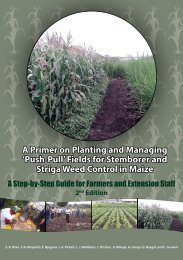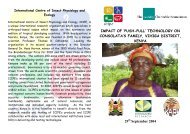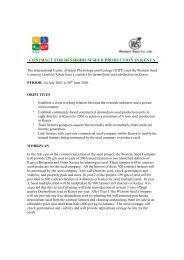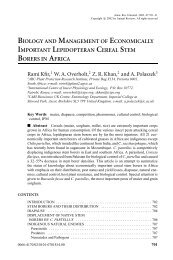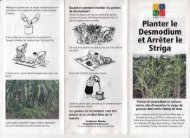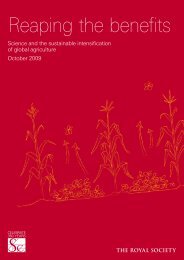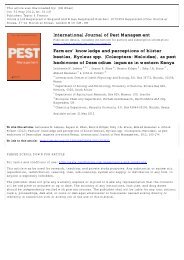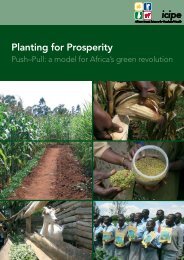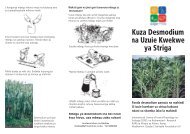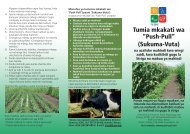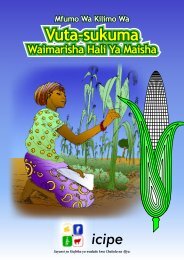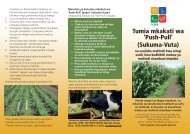Genetic engineering versus organic farming. - Push-Pull
Genetic engineering versus organic farming. - Push-Pull
Genetic engineering versus organic farming. - Push-Pull
You also want an ePaper? Increase the reach of your titles
YUMPU automatically turns print PDFs into web optimized ePapers that Google loves.
Your questions - our answers1.What is genetic<strong>engineering</strong> ?<strong>Genetic</strong> <strong>engineering</strong> is a new technology, involvingthe manipulation of genes. Scientists can transfergenes from one species to another, unrelatedspecies. This is possible because of the universal‘gene language’ – the genetic code. It is the samefor all living beings, be it animal, plants or microorganisms.For example, genes from a fish can betransferred to a tomatoe plant to render thetomatoe plant more resistant to frost. Theengineered tomatoe plant is genetically forcedto produce the fish chemical, because of thisuniversal ‘gene language’. So it produces an‘antifreeze’ chemical which the fish normallyproduces to survive in freezing cold water.With genetic <strong>engineering</strong> it is possible to breakdown the species boundaries set up by millionsof years of evolution. Never before was it possibleto transfer genes from animals to plants or frombacteria to humans. By combining the genes ofunrelated species, permanently altering their geneticcodes, novel organisms are created that will passthe genetic changes onto their offspring throughheredity.<strong>Genetic</strong> <strong>engineering</strong> is a corporate technology,mainly applied by industrial agriculture. In the year2000:• just five multinationals dominated the wholebiotech business in agriculture.• 98% of all transgenic crops were grown inthree countries: the USA, Canada and Argentina.• Two features were dominant: well over70% of all GM-crops grown world wide areherbicide-resistant plants, and over 20 % areinsect-resistant Bt-plants.2.What is <strong>organic</strong> <strong>farming</strong> ?Organic agriculture is a sustainable form ofproduction. It promotes and enhances biodiversity,biological cycles and soil biological activity. It isbased on minimal use of off-farm inputs and onmethods that restore, maintain and enhanceecological harmony. Organic <strong>farming</strong> does not usesynthetic chemical pesticides, herbicides andfertilisers relying instead on developing a healthy,fertile soil and sound crop rotations. In this way,the farm remains biologically balanced, with a widevariety of beneficial insects and other organismsto act as natural predators for crop pests and asoil full of micro organisms and earthworms tomaintain its vitality. If direct control measures haveto be taken to prevent serious crop damages,different agents of natural sources (for exampleNeem and Pyrethrum extracts) and biocontrolagents (for example ladybirds against aphids)can be used.Organic livestock production focuses on animalwelfare and husbandry methods that prevent theneed for veterinary treatments. It is a method ofagricultural production that is environmentallyfriendly, requiring high standards of animal welfarewith health benefits for people. Organic <strong>farming</strong>recognises that human health is directly connectedto the health of the food we eat and, ultimately,the health of the soil. Organic agriculture bothVandana Shiva, President ofthe Research Foundation forScience, Technology andEcology, India; winner of theAlternative Nobel prize 1993:"<strong>Genetic</strong>ally engineered plants arepatented. Farmers are not allowedto save or exchange seed fromtheir crops. Through patentinga thousand-year-old traditionis turned into a criminal act.This cannot work. I'm convincedthat <strong>organic</strong> <strong>farming</strong> is the onlyoption - for the South and forthe North."



